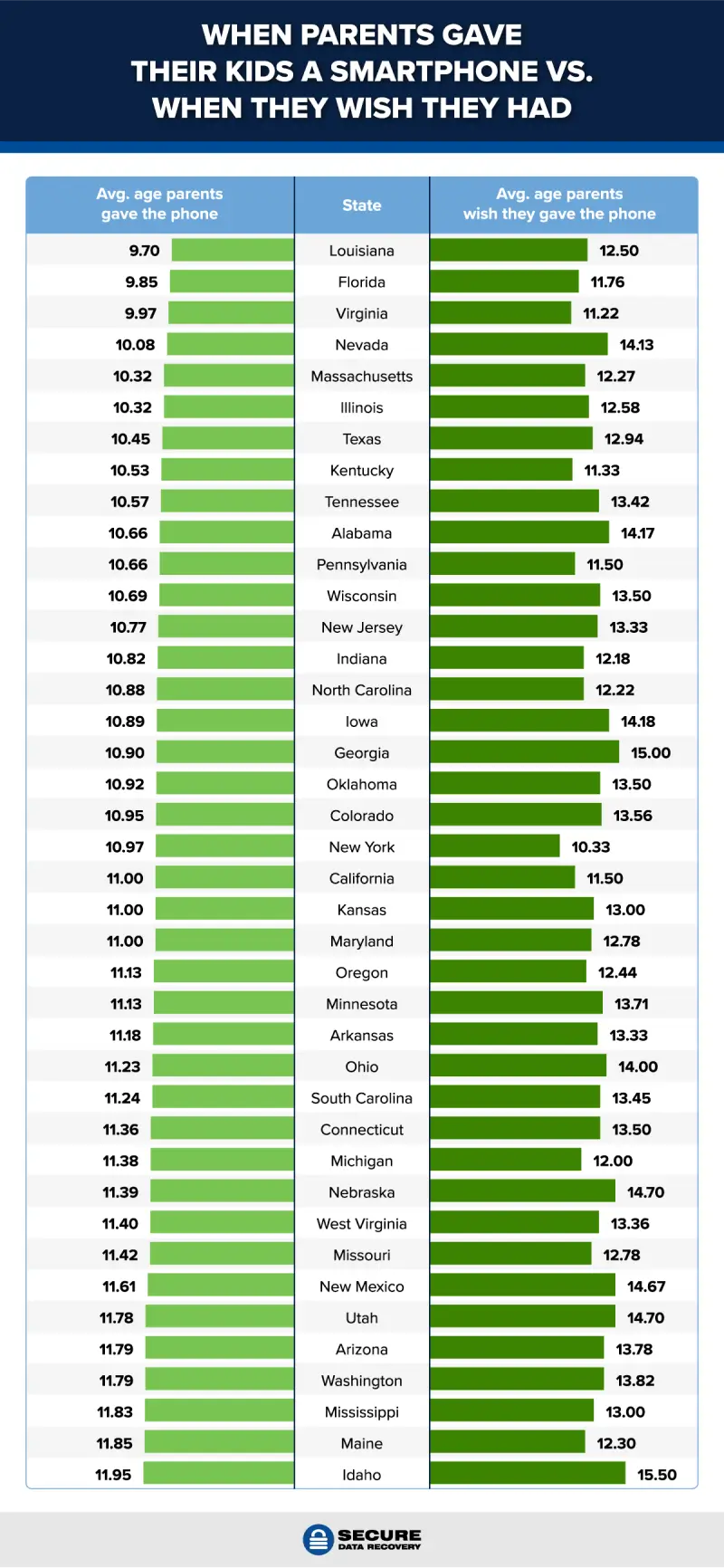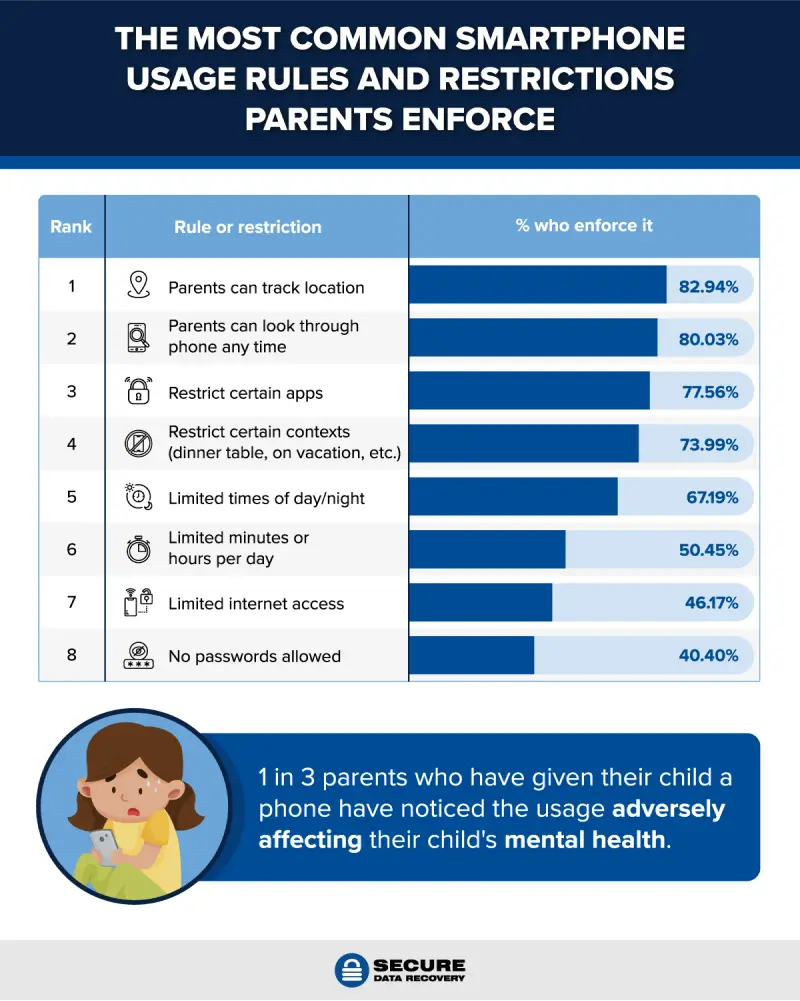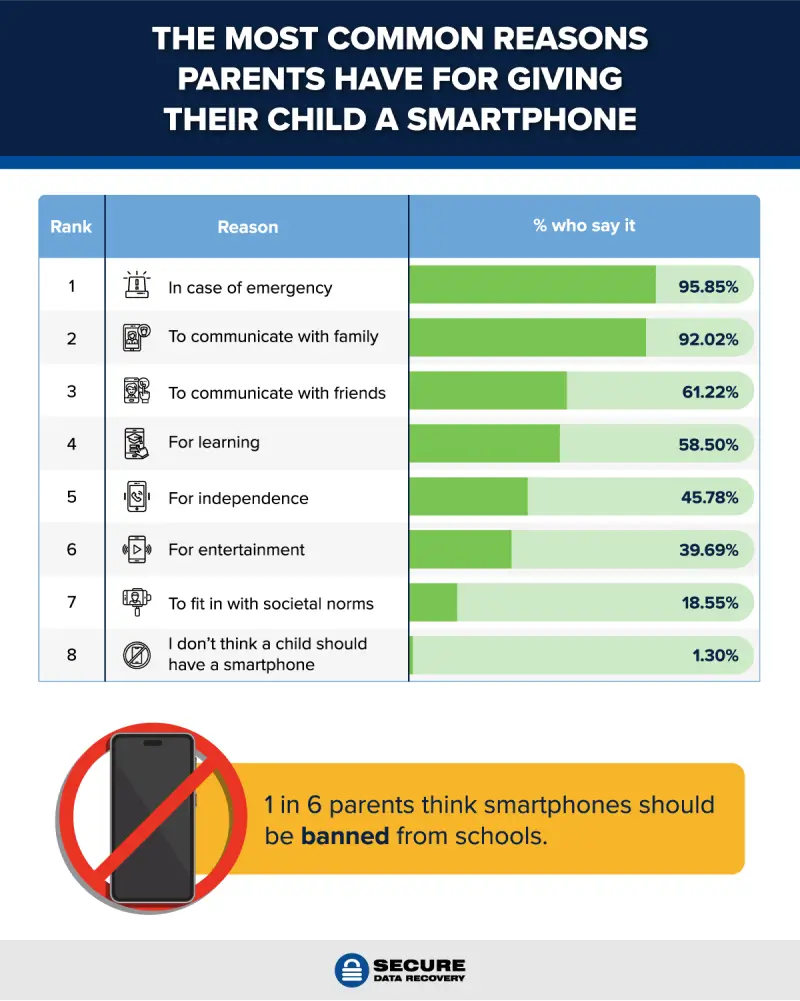The days of simple flip phones that only offered the ability to text and make phone calls seem to be a thing of the past. While these are still available for purchase, most people have their eyes set on the latest and greatest smartphones available. Smartphones are incredible pieces of technology that we have become accustomed to. With full access to the internet to search anything, anywhere, these phones have offered us convenience right at our fingertips.
While this technology has been enjoyed by adults for many years, the conversation has shifted to children and when they should be exposed to this tech. When is the right age to give a child a smartphone? What are the pros and cons of giving a child a smartphone? Will having a smartphone impact a child’s mental health? These are all questions many parents struggle to answer on their own as most cannot simply turn to their parents or their own childhoods for advice or guidance.
At Secure Data Recovery, we understand the impact technology can have on our everyday lives and decided to survey parents across the U.S. to determine how they are handling these devices. We asked everything from what age they gave their child a smartphone, if they feel they gave it at the right age, what rules they have in place for usage, and more. Read on to learn which parts of the country are giving kids smartphones earliest and latest in life.
Key Takeaways
- Parents in Louisiana, Florida, and Virginia give their children smartphones earliest in life.
- Parents in Idaho, Maine, and Mississippi give their children smartphones the latest in life.
- On average, 1 in 5 parents wish they had given their child a smartphone later than they had.
- Overall, the most common rules parents have for their child's smartphone usage include their ability to track their location, the restriction of certain apps, and their ability to look through their child's phone at any time.
- When it comes to smartphones in schools, 1 in 6 parents think they should be banned, while 3 in 4 think they should just be restricted.
The States Where Parents Give Their Kids Smartphones Earliest and Latest in Life

The decision to give your child a smartphone is ultimately up to you as a parent. Still, sometimes it is helpful to gain an idea of how other parents are handling certain situations . . . like when is the right age to give a child a new piece of technology.
Overall, parents in Louisiana give their children smartphones earliest in life with the average child getting theirs by age 9. In addition to the age parents gave the phone, we also wanted to learn if they were happy with the decision or if they wished they had given it to them earlier or later in life. Although Louisiana parents give their kids a smartphone by age 9 on average, they wish they would have waited until their child was 12.
Up next on our ranking is Florida and Virginia where parents also give their children a phone by age 9 on average, though both states would have rather waited until their child was 11. In general, 1 in 5 parents wish they had given their child a smartphone later than they had. One outlier to this, however, is New York, where the average parent wishes they would have given their child a phone earlier in life.
Our research found that parents in Georgia, Nevada, and Idaho have the biggest difference between the age they gave their child a phone and when they wish they did. While Georgia and Nevada parents wish they waited an additional four years, Idaho parents, on average, wish they gave the phone about three and a half years later.
In addition to parents who have already provided their child with a phone, we surveyed parents of children who have not yet given their child a phone. While parents across the U.S. who have given the tech did so when their child reached 11 years old, on average, parents who have yet to give a phone plan to wait until their child is 13 years old, on average.
As our research shows, there is no set age that parents have found is the magic number for when to give a child a smartphone. According to experts at the Child Mind Institute, the decision should not be solely based on a child’s age, but rather on their “social awareness and understanding of what the technology means.”
Some things experts recommend you consider before giving your child a phone include how well your kid takes care of things, how easily they pick up on social cues, and their understanding of the impact that what they post online can have on their future.
The Most Common Rules Parents Have for Smartphone Usage

As many parents already know, the decisions don’t come to an end after you buy your child a smartphone. This technology opens doors to a whole new world that your child likely had never been exposed to before. From unlimited internet access to the more than one million apps available for download, there are still some aspects of the technology that children may not be mature enough to access.
To help combat this, many parents have rules or restrictions in place to keep their children safe. In addition to the average age, we also asked parents about the rules they have in place. Leading the way as the most common rule, with 83% of parents saying they use it, is location tracking. Having access to your child’s location through their phone can help to provide parents with peace of mind when their child is out with friends, walking home from school, and more.
Second on the list of popular rules is parents’ ability to look through their child’s phone whenever they want. Going through someone’s phone can feel like an invasion of privacy, but in the case of parents, it can often be important to ensure their child is following the rules and staying safe.
In third place, 78% of parents say they restrict downloads of certain apps. With so many apps for all types of ages, it is understandable that parents want to keep their kids away from apps designated for older people. From dating apps to more mature games, there are plenty of programs that are not kid-friendly available in the app store.
Regardless of your child’s age, it is important to ensure that expected behaviors when using smartphones are discussed. One tip to help keep rules and restrictions in place is to create a media plan or contract with your child. If you need help determining what to include in this document, the American Academy of Pediatrics has an online tool to help guide parents and create a plan that works for their families.
Why Parents Believe Their Kids Need Smartphones

After uncovering the age parents give phones and the rules they put in place, we wanted to turn our attention to the reasons parents believe kids need smartphones in the first place. For parents in the U.S., in case there is an emergency leads the way as the top-reported reason to hand over a phone to their children.
Today’s technology makes staying connected to the people closest to you easy. Perhaps that’s why communicating with family and friends is the second and third most common reason parents think their kids need a phone. From text messages and phone calls to video calls and social media, there are so many ways to catch up with the people in life we care most about, and having that technology in our pocket, anywhere, anytime, makes it that much easier.
The fourth most common reason we discovered in our research is for learning. Technology is constantly evolving and kids are exposed to it more now than ever before. By giving your child a phone, you help them to engage with tech and better prepare them for the future in which they will work closely with a variety of devices daily. Additionally, apps and videos online can also provide learning opportunities for your child.
Rounding out our list, independence, entertainment, and fitting in with social norms claimed the fifth, sixth, and seventh spots on the list of reasons parents have for giving their child a phone. While there are many reasons to give a child a phone, some parents have found themselves feeling pressured to make the decision. In fact, 62% of parents say they have felt pressured by their own kids to give them the device.
We Can Help Restore Your Kids’ Lost Data
There are so many things in a child’s life that a parent must protect their child from and prepare them for. From stranger danger at the park to handling a bully at school, there are many aspects of a child’s life that parents must navigate themselves.
At Secure Data Recovery, we may not have the answer as to when is the best age to give your child their first smartphone or which apps are safe for their development, but we can help ensure their data remains intact. Whether your kid had jumped into a pool while holding their phone or they ventured onto your device and exposed your computer to a virus, our team is here to help.
With a 96% recovery success rate, you can take one thing off of your to-do list, and focus on your kids. Our team specializes in restoring data across a variety of devices, so whether you are seeking iPhone data recovery or hard drive data recovery services, we have you covered.
Methodology
In this study, we surveyed parents in every state to learn more about opinions regarding children's smartphone usage in 2024. We asked everything from what rules and restrictions they have in place, why they think a child needs a smartphone, how old their child was upon receiving their phone, and more.
We then calculated the average age by state and ranked them accordingly. For parents who have not yet given their child a phone due to age, we asked them what their plans were for the future. The average age each state and city gives their kid a smartphone is only based on the data collected from parents who have given their child a phone.






